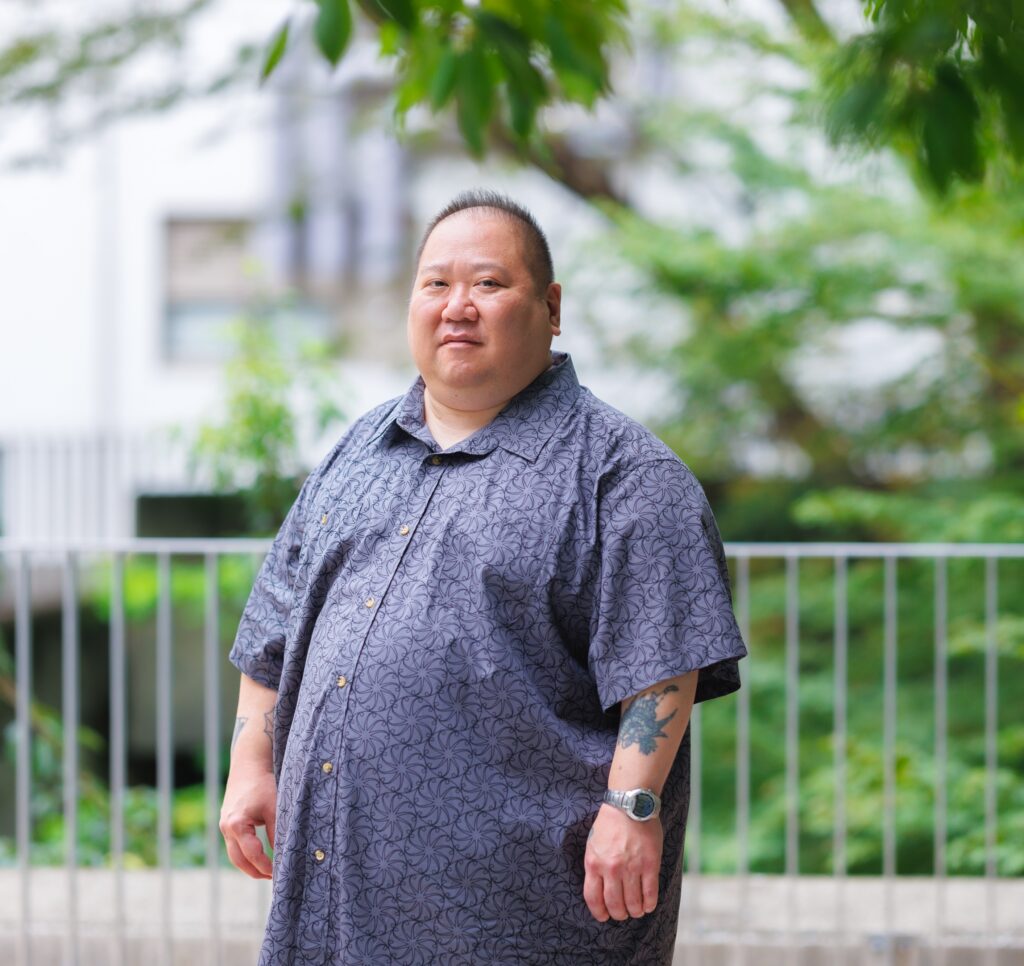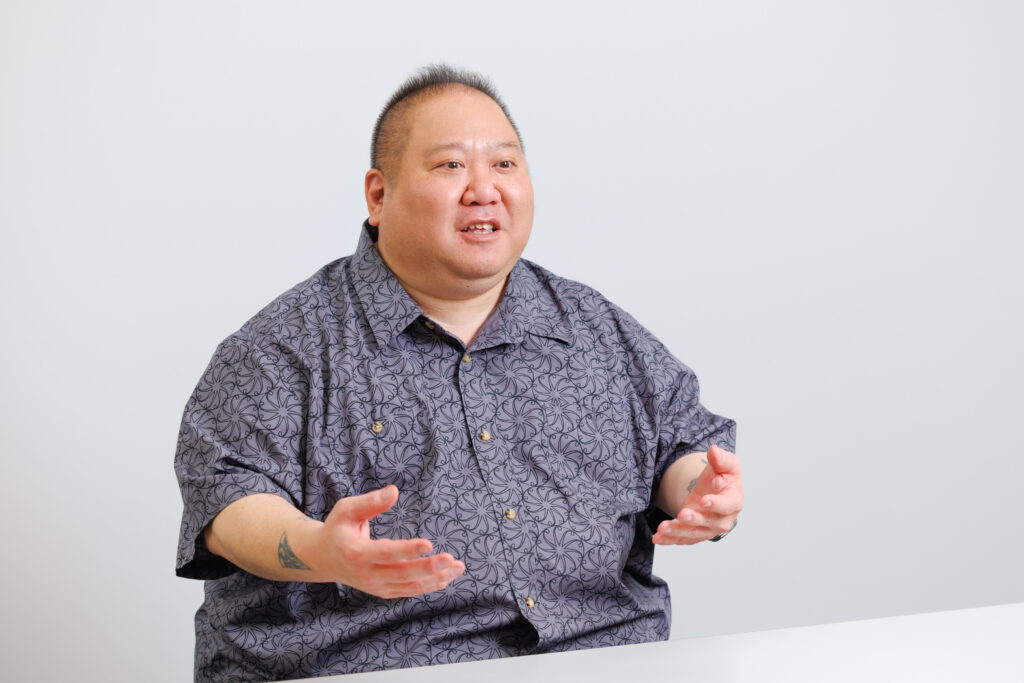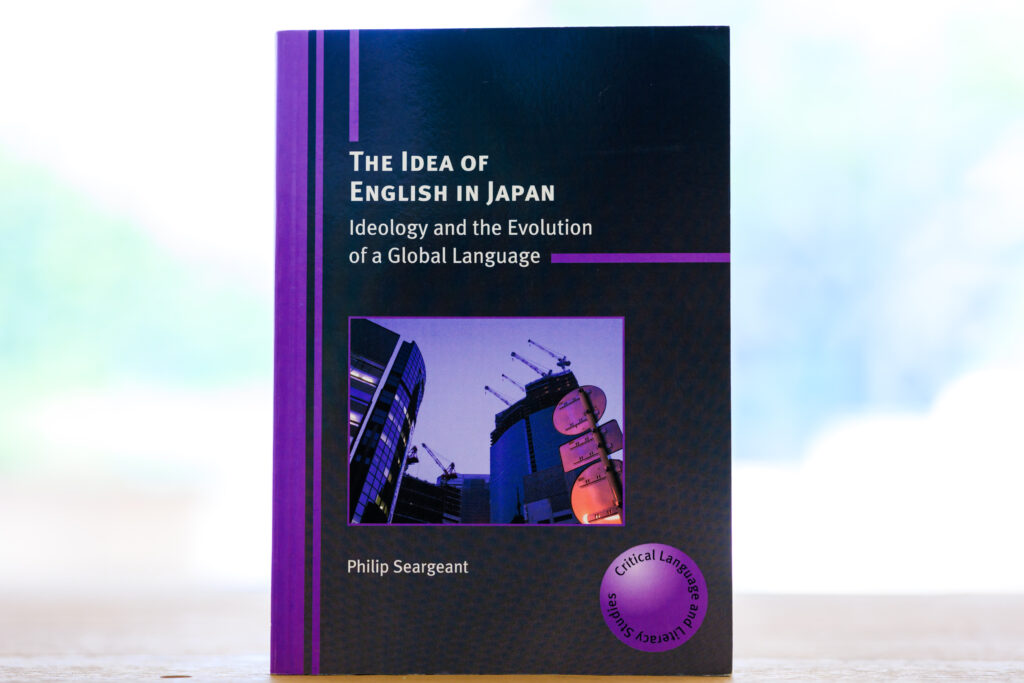
Associate Professor Gavin Furukawa of the Faculty of Foreign Studies is a sociolinguist exploring connections between languages and societies. Using a discourse analysis method, he uncovers the sociological impact of languages and ideologies embedded in them. His recent research includes examinations of language ideology around Japanese perception of English, gender issues in Japan, and the use of Hawaiʻi Creole.
As a sociolinguist, my work revolves around exploring connections between languages and societies and how they mutually affect each other. I employ a discourse analysis method for my research. Discourse, “danwa” in Japanese, extends beyond a mere conversation. I scrutinize linguistic units larger than a sentence, often in spoken contexts.
My research encompasses the examination of various forms of communication, ranging from casual conversations among friends, to political debates during elections, and discussions surrounding policymaking. I explore people’s behavior within their culture and society, and the intersection of diverse cultures through their language use.
Construction of language ideology in Japan through various forms of media

My specialization lies in the study of language ideology, uncovering ideologies embedded within languages, and how languages can be used to construct them. I am particularly intrigued by English language ideology as portrayed in Japanese television. For example, when watching it, it becomes evident that Japanese people often associate English with coolness and intelligence, despite language proficiency having no correlation with these qualities. Japanese society has developed a positive ideology around English fluency.
Similar associations can be detected with other Western languages, such as French. Conversely, there exists a tendency to undervalue Southeast Asian languages. These examples highlight the presence of language ideologies in the society. To substantiate these theories, I conduct research by analyzing various forms of media, including TV shows, commercials, magazines, social media, restaurant signs, and campus signage. Evidence supporting these language ideologies can be found everywhere.
I’ve been expanding to new fields of study. One revolves around examining language ideologies surrounding gender issues in Japan. I am involved in a government-led research project focusing on gender boundaries in Japan. By analyzing languages surrounding genders, I aim to uncover challenges faced by gender-nonconforming individuals.
Another research project is on the use of formality in social media, specifically focusing on the use of honorifics in TikTok in Japan. The growing importance of social media platforms may have led to changes in the way that Japanese businesses operate daily, particularly in terms of formality within companies. I seek to uncover how these changes are impacting Japanese society.
Research on Hawaiʻi Creole and native Hawaiian culture
In another study, I explore the language ideologies behind Hawaiʻi Creole. Growing up in Hawaii, we were often discouraged from using Hawaii’s Creole because it was perceived as uneducated. I analyze the use of Hawaiʻi Creole among people of Hawaii, as it signifies friendship, values, alliance, and beliefs related to Hawaiian culture.
Furthermore, I collect data to assess the influence of native Hawaiian culture on education, as certain values and beliefs unique to native Hawaiians may not translate well into conventional educational settings. I also investigate Hollywood movies to understand how Hawaii and its people are portrayed in films.
Unveiling subtle transformations in Japanese society
Through my research, I have brought to light some changes in Japanese society that often go unnoticed by the Japanese public.
Firstly, the unfounded belief that English is superior to Japanese has significant repercussions on the Japanese sense of value and self-worth. Feeling inferior to their English-speaking counterparts puts Japanese individuals at a disadvantage in various settings such as business negotiations.
Secondly, the notion of Japanese society as rigid and traditional is no longer entirely accurate. Observing Japanese verbal interaction reveals that Japanese is not as formal as commonly perceived. Nowadays, polite forms of the language known as “keigo” in Japanese are used less frequently, and there is a more relaxed sense of formality in society. Social distances between corporate leaders and their employees have also decreased, as corporate heads now recognize the benefits of flexible relationships with their employees.
Culturally speaking, Japan has become more Westernized than the local population might think. However, the average Japanese person is often unaware of how different Japan is from the post-war era and how it continues to evolve.
My hope is that my research will draw the attention of the Japanese public to their choices of language and encourage them to consider the possible consequences of their unconscious language choices. I aim to contribute to the realization of a more self-aware Japan, in line with the image many Japanese people hold of their nation.
The book I recommend
“The Idea of English in Japan: Ideology and the Evolution of a Global Language”
by Philip Seargeant, published by Multilingual Matters

This is one of the books which inspired me to pursue my research on the link between languages and societies. Drawing from his experiences teaching English for many years in Japan, the author introduces interesting examples of Japanese schools and English language programs in Japan. Through his observations of how Japanese people use and perceive English, he explores ideology embedded in the Japanese education system.
-
Gavin Furukawa
- Associate Professor
Department of English Studies
Faculty of Foreign Studies
- Associate Professor
-
Gavin Furukawa received a B.A. in Humanities from University of Hawaiʻi West Oʻahu, an M.A. and a Ph.D. in Second Language Studies from University of Hawaiʻi at Mānoa. He joined Sophia University in 2018. A fourth-generation Japanese American speaking English, Hawaiʻi Creole, and Japanese, Furukawa often researches language contact situations between these three distinct language communities.
- Department of English Studies
Interviewed: September 2023